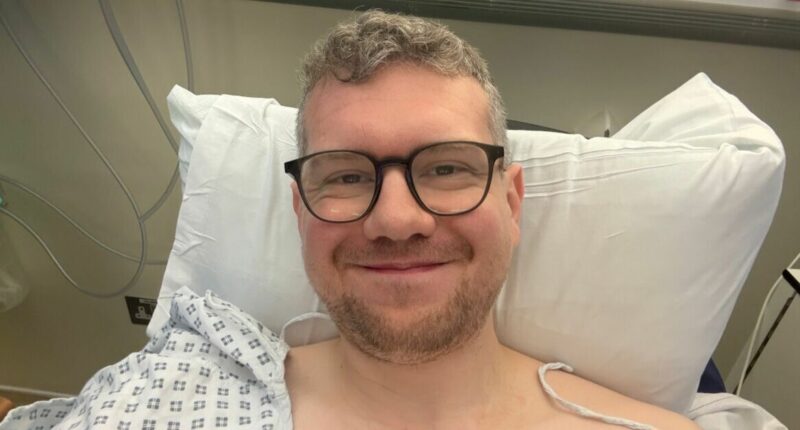Share this @internewscast.com
In my relatively short journey through life, I’ve been fortunate when it comes to my health. The only time I required surgery was during my childhood, after accidentally spilling a boiling kettle over my head at my grandmother’s house—a mishap whose cause remains a mystery to me. I recall a kind neighbor taking us to what I believe was the A&E department at George Eliot Hospital in Nuneaton, recognizable by its vivid artwork on the exterior. There, I underwent a skin graft under general anesthesia.
The memory of the mask placed over my face, combined with the image of my worried parents watching from behind a screen, lingers with me. Although, I sometimes wonder if the latter is a fragment of imagination rather than reality. Recently, I found myself facing surgery once more due to a hernia. After years of procrastination, I finally decided to consult my GP to discuss the best course of action. The hernia wasn’t painful but would occasionally cause discomfort, particularly after long periods of standing.
Despite the hernia, I maintained an active lifestyle, enjoying activities like running and cycling without hindrance. Yet, it nagged at me, especially from a cosmetic perspective, as it had become more pronounced.
The surgery went smoothly, with only a minor hiccup when I fell out of bed in the ward afterward due to a numb left leg. Fortunately, the stitches held firm.
It went very smoothly, apart from falling out of my bed in the ward afterwards, as my left leg was very numb.
Luckily, the stitches remained in place.
It was overall more or less an in-and-out job, as I arrived at 11am and was discharged at about 8pm.
My surgeon even came and collected me from the waiting area sooner than planned.
I was struck by how routine everything was, akin to a garage tending to people’s cars one after another.
The NHS certainly isn’t dead yet. What I experienced – a tiny part of it, granted – seemed like a well-oiled machine.
When I was put under, faded memories of my previous experience of theatre came flooding back.
Post-op, things now feel and look back to normal, apart from a scar on my abdomen, of course.
As I write this, the pain is mostly gone, and I’m back at work.
I cannot lie, boredom had set in during sick leave. I’m not someone who enjoys sitting still for days on end.
My time was taken up by reading, writing a novel, whose plot is very much still undetermined; baking, watching films and gazing longingly at my bike, wishing I could jump on it and ride away.
I was placed on a waiting list after a visit to Croydon University Hospital in February, and in September, found myself wondering if I had somehow missed contact from the NHS notifying me of a surgery slot.
Coincidentally, that same week I got the call.
This meant I was queueing for around eight months.
I didn’t mind in the slightest, as I knew others were in greater need than me, and were rightly a priority.
But nevertheless, I wanted my procedure and recovery over and done with as soon as possible so I could get on with my life.
I’m glad I had it done, and I’m very grateful to the medical professionals who made it possible, but overall I found myself viewing the repair as an inconvenience.
Although quite a departure from my normal routine, my experience was nothing compared to that of others, with many living in pain and/or with reduced mobility, as their wait to be tended to goes on, or they fork out thousands of pounds for private surgery.
A friend of mine was recently referred for surgery on his nose and treated in a day.
As of August, the Referral to Treatment (RTT) waiting list stood at 7.41million cases, consisting of approximately 6.26million individual patients, according to the British Medical Association (BMA).
Around 2.89million of these patients had been waiting more than 18 weeks, and about 191,500 of these patients were waiting over a year for treatment – a decrease from around 191,600 the previous month.
The median waiting time for patients waiting to start treatment was 13.4 weeks.
The pre-COVID median wait was eight weeks in August 2019.
The NHS Constitution states that patients should wait no longer than 18 weeks from GP referral to treatment.
This week, it has been reported that health service bosses are seeking an emergency injection of £3billion to cover unexpected costs.
They have also warned ministers that patients would wait longer for treatment and hospitals would start rationing care if this cash were not forthcoming.
Sir Keir Starmer announced during his conference speech in September that English NHS patients will be able to access care using a new “online hospital” service from 2027.
Its intended purpose is to cut waiting lists and allow patients who have been referred by a GP to talk to a hospital specialist on the phone or via a video call.
This sounds good, as my initial hospital appointment at the tail end of winter, which I attended in person, did not take long at all.
But people will still have to turn up in the flesh for pre-ops.
You can’t do a blood test and an ECG for yourself at home.
It is said over and over again that Labour needs to make a tangible difference – what it was elected to do – while in power, and the NHS is at the top of the priority list.
But forget about whether this could help the party stave off Reform UK and win the next general election.
That consideration comes second to if effective policies could improve people’s lives.
Are you waiting on an NHS waiting list? Get in touch via adam.toms@reachplc.com or 07788 108490.












